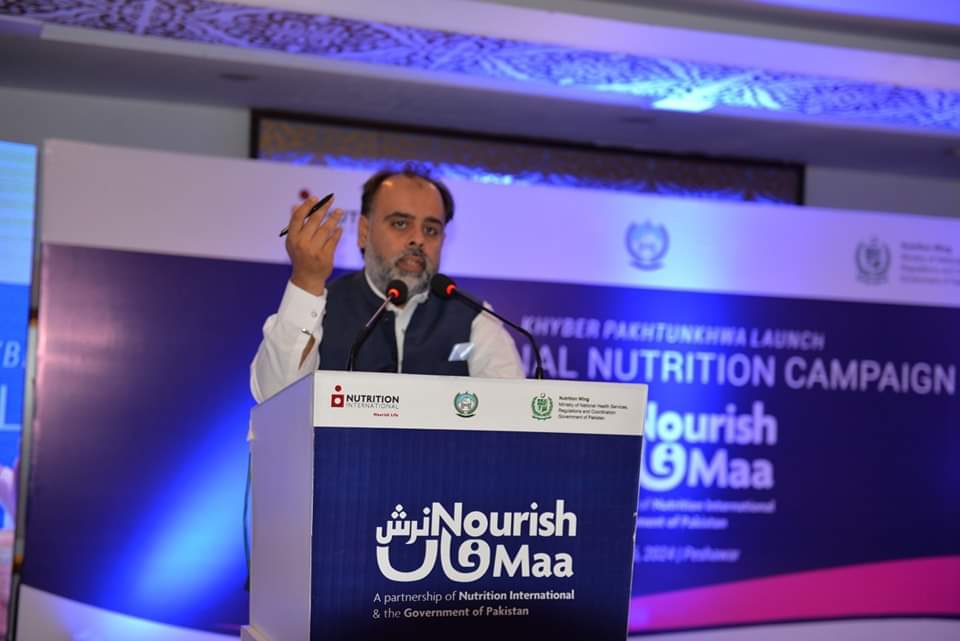PESHAWAR: Nutrition International, in collaboration with the Health Department of Khyber Pakhtunkhwa (KP), has launched the ‘NourishMaa’ campaign in the province. This initiative aims to enhance maternal nutrition by improving the knowledge and skills of healthcare providers (HCPs) and frontline health workers (FHWs).
Already operational in six districts across Punjab and Sindh, the campaign has now extended to KP, specifically targeting Mardan and Battagram, two districts with particularly high rates of maternal malnutrition.
“The health and nutrition of mothers and children are foundational pillars for the overall development of our society,” stated Syed Qasim Ali Shah, Minister for Health KP. Emphasizing the critical role of maternal nutrition in ensuring the well-being of both mothers and children, the Minister highlighted the urgency of addressing maternal malnutrition and the essential role of healthcare providers in fostering a healthier future. He called for a concerted effort from all stakeholders to implement effective interventions and ensure sustained improvements in maternal nutrition throughout the province.
Referencing the National Nutrition Survey (NNS) 2018, the Minister noted that women of reproductive age face a triple burden of malnutrition: 14.4% are underweight, 38% are overweight or obese, and 42.7% suffer from anemia, along with a high prevalence of other micronutrient deficiencies. While KP’s rates of anemia (27.5%) and micronutrient deficiencies are lower than the national averages, significant efforts are still required to improve these indicators.
To tackle these issues, the government prioritizes women-centric and equity-based strategies and programs, which have guided the development of this campaign. The Minister expressed appreciation for Nutrition International’s support and requested the expansion of the campaign to other districts in KP with low maternal nutrition indicators.
The NourishMaa campaign, led by Nutrition International in collaboration with the Ministry of National Health Services, Regulations & Coordination (MoNHSRC) and provincial health departments, complements the government’s ongoing efforts to enhance women’s nutrition in Pakistan. Currently operational in four districts of Sindh – Karachi East, Korangi, Qambar Shahdadkot, and Larkana – and two districts of Punjab – Rawalpindi and Bahawalpur, the campaign now includes Mardan and Battagram.
The campaign’s core objectives are to raise awareness about maternal nutrition and strengthen the capabilities of HCPs and FHWs in both public and private sectors, incorporating nutrition counseling into their routine practice. This initiative aims to reach over 6,000 HCPs and FHWs in the targeted districts, enhancing their knowledge and capacities in maternal nutrition and integrating nutrition counseling into their daily activities. This comprehensive approach seeks to create a lasting impact on maternal and child health in the country.
“Nutrition International is dedicated to advancing maternal nutrition in the country through research, program implementation, technical assistance, policy advocacy, and capacity building of key stakeholders,” said Dr. Irfan Ullah, Deputy Country Director for Pakistan, Nutrition International, at the launch event. He added, “Improving knowledge, attitudes, and practices of healthcare providers is a key component for creating an enabling environment for maternal nutrition, and this objective is at the core of what the NourishMaa campaign aims to achieve.”
Highlighting the campaign’s success in Sindh and Punjab, Dr. Irfan shared that the project reached over 5,600 HCPs and FHWs, emphasizing the importance of their role in nutrition counseling. Through interpersonal communication, sensitization sessions, capacity building workshops, and seminars, the campaign has made significant progress. Additionally, specialized doctors from all targeted districts were trained as master trainers who engaged over 700 HCPs on maternal nutrition. Leveraging diverse media platforms, the campaign reached over 1.6 million people, covering a wide range of maternal nutrition topics.
Based on the campaign’s learnings, Dr. Irfan emphasized the need to integrate maternal nutrition into harmonized medical and allied health curriculums and enhance accountability for maternal nutrition service delivery within the health sector.


